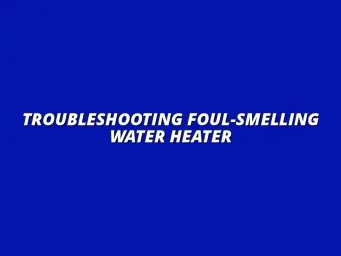
Seasonal Water Heater Care Tips
Understanding Seasonal Water Heater Maintenance
Seasonal maintenance for water heaters is crucial for ensuring they operate efficiently throughout the year. Just like how we prepare our homes for changing seasons, our water heaters need special attention during these times. Neglecting maintenance can lead to costly repairs and energy inefficiency, so understanding the value of seasonal care is essential!
The Importance of Seasonal Maintenance for Water Heaters
Regular maintenance is not just good practice; it's necessary! Seasonal changes can significantly impact how well your water heater performs. With proper care, you can extend the lifespan of your unit and reduce the likelihood of unexpected breakdowns. For more advice on regular checks, see this guide on regular bathroom water heater checks.
How Seasonal Changes Affect Water Heater Performance
The performance of your water heater can vary with the seasons. For example, in winter, cold temperatures can lead to lower water temperatures and increased energy consumption. On the other hand, in summer, higher temperatures can sometimes cause overheating issues.
Benefits of Regular Maintenance
Keeping up with seasonal maintenance offers numerous benefits, including:
- Improved Efficiency: Regular checks help maintain optimal performance. Learn how to maintain your water heater efficiently here.
- Cost Savings: Fewer repairs and lower energy bills make for a happy wallet!
- Longer Lifespan: Proper care can extend the life of your water heater.
- Peace of Mind: Knowing your system is well-maintained allows for less worry about unexpected issues.
Winter Water Heater Maintenance Tips
Winter is a challenging time for water heaters, and specific preparations can make a big difference. Ensuring your unit is ready for the cold can prevent costly damage and help maintain performance. Let’s dive into some essential tips for winter care!
Preparing Your Water Heater for Cold Weather
To keep your water heater running smoothly during winter, follow these crucial steps:
- Insulate Your Water Heater: Wrap the heater with insulation to retain heat.
- Check External Pipes: Insulate pipes that are exposed to cold air. For tips on preventing frozen pipes, check out these winter plumbing tips.
- Examine the Venting System: Ensure that vents are clear of snow or ice.
Insulating Your Water Heater and Pipes
Insulation is key to preventing heat loss! By wrapping your water heater and insulating exposed pipes, you can significantly reduce energy waste. This strategy not only improves efficiency but also protects your system from freezing.
Checking the Temperature and Pressure Relief Valve
A critical component in water heater safety is the temperature and pressure relief valve. Make sure to check its functionality before winter sets in. If it's faulty, it could lead to system failure!
Preventing Frozen Pipes and System Failures
Frozen pipes can wreak havoc on your plumbing system. To avoid this, some prevention strategies include:
- Keep the Heat On: Maintain a consistent temperature in your home.
- Let Faucets Drip: Allow a small trickle of water to flow through your faucets.
- Open Cabinet Doors: This allows warm air to circulate around pipes under sinks.
Tips for Maintaining Optimal Water Temperature
It's essential to keep your water heater set at the right temperature to prevent freezing. Aim for a temperature of at least 120°F (49°C) for optimal performance. This not only helps in preventing freezing but also ensures that your water heater operates efficiently! Learn more about preventing water heater freezing this winter.
Identifying Signs of Potential Freeze Damage
Stay alert for signs that your water heater might be at risk of freezing! Look for:
- Unusual Noises: Banging or popping sounds could indicate sediment buildup.
- Inconsistent Water Temperature: Fluctuating temperatures might signal a problem.
- Leaks: Any signs of leaks should be addressed immediately!
Routine Inspections and Servicing
Regular inspections are vital, especially during the winter months. Taking the time to look for potential issues can save you from costly repairs later. Here’s what you should check during your winter inspections!
What to Look for During Winter Inspections
When inspecting your water heater, pay attention to:
- Temperature Settings: Ensure they are appropriately set.
- Visible Damage: Check for rust or leaks on the tank.
- Pipe Condition: Look for signs of corrosion or wear.
When to Call a Professional for Water Heater Service
If you spot any of the above issues or if something feels off, it might be time to call a professional! Regular service can help address problems early and keep your water heater in top shape during the colder months. Don’t hesitate to seek help if you're unsure! For annual inspection tips, refer to this helpful guide: Annual Water Heater Inspection Tips.
Addressing Common Questions about Seasonal Water Heater Care
It’s normal to have questions when it comes to maintaining your water heater seasonally. Many people wonder how often they should get their water heater serviced, or they might be unsure about the signs that indicate their unit needs prompt attention. By addressing these common queries, I hope to help you feel more confident in your water heater maintenance routine!
Let’s dive into some frequently asked questions and clear up any confusion. This way, you can ensure your water heater is always operating smoothly, no matter the season.
Frequently Asked Questions on Water Heater Maintenance
One of the most common concerns is how often you should schedule professional maintenance for your water heater. Regular servicing can help extend the life of your unit and improve its efficiency. Generally, I recommend scheduling maintenance at least once a year, but you might need to do it more often depending on your usage and the water quality in your area.
Another crucial question is, "What are the signs my water heater needs immediate attention?" Knowing these signs can save you from more significant problems down the line. Here are some key indicators:
- Unusual noises, like banging or popping
- Inconsistent water temperatures
- Leaks around the tank or pipes
- Discolored or foul-smelling water
How Often Should I Schedule Professional Maintenance?
Regular maintenance is vital for the longevity and efficiency of your water heater. As a rule of thumb, I suggest having a professional check your unit at least once a year. However, if you notice any signs of wear or unusual behavior, don't hesitate to call in a professional sooner. If you need a plumber in the Birmingham area, consider checking out this plumber in Billesley, Birmingham.
Moreover, if your household uses a lot of hot water, you might want to consider more frequent inspections. Keeping up with maintenance not only ensures your water heater runs smoothly but can also save you money on energy bills in the long run!
What Are the Signs My Water Heater Needs Immediate Attention?
Being proactive is key when it comes to water heater issues. If you spot any of the signs mentioned earlier, it's crucial to take action. Delaying repairs can lead to more significant problems, including leaks or even complete failure of the unit.
Here’s a quick checklist of signs that should prompt you to call a professional:
- Frequent fluctuations in water temperature
- Visible rust or corrosion on the tank
- Water pooling around the unit
- Unpleasant odors from the hot water
Seasonal Water Heater Maintenance Best Practices
When it comes to seasonal water heater maintenance, having a solid plan is essential. Creating a checklist can ensure you don’t miss any crucial steps throughout the year. This checklist will help keep your water heater in tip-top shape during both winter and summer months. Proper drainage is also important for landscaping health; see how essential drainage contributes to healthy landscaping.
By sticking to these best practices, I find that many homeowners can significantly enhance their water heater’s performance while preventing unnecessary breakdowns.
Creating a Seasonal Maintenance Checklist
A well-thought-out checklist can guide you through seasonal maintenance tasks, making it easier to keep your water heater in excellent condition. Here are some key steps for effective winter and summer care:
- Inspect the tank for rust or leaks
- Test the temperature and pressure relief valve
- Flush the tank to remove sediment buildup
- Check the anode rod for corrosion
Key Steps for Effective Winter and Summer Care
Each season has its specific maintenance tasks that can enhance performance. During winter, focus on insulation and checking for signs of freeze damage. In summer, don’t forget to flush your tank and check energy efficiency settings.
Here’s a handy checklist tailored for each season:
- Winter: Insulate pipes, check valves, and monitor for freezing signs.
- Summer: Flush the tank, check the anode rod, and adjust temperature settings.
Tracking Your Maintenance Activities for Future Reference
Another great practice is keeping track of your maintenance activities. Documenting when and what services you perform will provide insight into when your water heater might need servicing again. This record-keeping can help you stay on top of necessary tasks and remind you when to schedule professional inspections!
Consider using a simple log format to note down the date and type of maintenance performed, which can make a world of difference in staying organized. This way, you can ensure that your water heater always remains in optimal condition!
Conclusion and Final Thoughts on Seasonal Care
Taking a proactive approach to water heater maintenance is essential for its longevity and efficiency. By addressing common concerns and following a well-structured checklist, you can avoid costly repairs and keep your water heater running smoothly.
Incorporating regular inspections into your routine will undoubtedly enhance your experience with hot water supply, ensuring that your system remains a reliable source for your home. Remember, a little bit of maintenance goes a long way!




